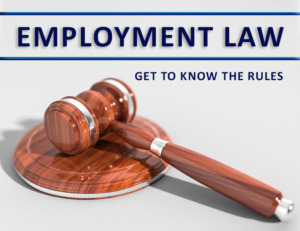
I co-host The Wealth Building Hour radio show. I recently had the pleasure of interviewing two guests, Ken Rose, Esq. and Jack Landers, who addressed employment law issues and the use of Employment Practices Liability Insurance to protect your business against employment lawsuits.
After listening to Ken and Jack share several cases where a business owner very innocently stumbled in this area – and got severely fined or even put out of business – I decided to address the topic in this month’s newsletter, too, along with posting the interview on our website.
Keep on reading to learn more about the six ways to protect your business from employment lawsuits:
1- Wage and Hour Laws and Discrimination
Much of the employment litigation in California today concerns either the wage and hour laws or discrimination of some sort. The main issues that come up again and again are:
- Not paying overtime to an employee who worked more than 8 hours in a day or 40 hours in a week
- Not providing meal breaks, or rest breaks to employees
- Discrimination in the workplace … from age, sexual orientation, race, religion, color, disability, gender, marital status, medical condition, etc. More information about discrimination is contained in the poster that that all employers are required to display by California Department of Fair Housing and Employment
The lawsuits in just these two general areas often snowball, and result in millions of dollars in liability, even for small companies.
2- Conduct a Workplace Investigation
The company has a legal duty to conduct a workplace investigation when an employee makes an internal complaint to their employer, particularly if discrimination is alleged. If they don’t, it can really come back to bite the owner severely.
The company can conduct a workplace investigation in several different ways. The business doesn’t need to use an attorney; they can use a manager or someone who is in their Human Resources Department. Using internal people, however, can often lead to conflicts of interest. So, more and more, business owners utilize an outside firm to do their workplace investigations.
3- Determining the Classification of an Employee
Another area in litigation concerns whether certain individuals were properly classified by the business as “exempt,” which means they are not entitled to overtime, versus “non-exempt,” where they are entitled to overtime pay. If it turns out the employer classified the employee incorrectly, they are often facing a major liability going back to when the employee first began working for them under the wrong classification … plus penalties!
4- Independent Contractor vs Employee
At issue is whether the employee is being treated as an “independent contractor” or an “employee.” Liability can again snowball if you misclassify employees for wage and hour purposes. The IRS does not give a bright-line answer but at least it helps an employer make this important determination.
The IRS has designated three categories of control that need to be reviewed:
- Behavioral control:
Does the company control or have the right to control what the worker does and how the worker does his or her job? - Financial control:
Are the business aspects of the worker’s job controlled by the payer? (These include things like how the worker is paid, whether expenses are reimbursed, who provides tools/supplies, etc.) - Type of relationship:
Are there written contracts or employee type benefits (i.e. pension plan, insurance, vacation pay, etc.)? Will the relationship continue and is the work that is performed by the worker a key aspect of the business?
If in doubt about whether you are dealing with an “independent contractor” or “employee,” the employer or worker can file IRS Form SS-8 to request a free determination from the IRS. After the IRS researches the issue, which can take up to six months, the IRS will issue: (a) a formal determination letter, which is binding on the IRS, (b) an information letter, which is advisory but not binding, or (c) a courtesy letter in very limited circumstances.
5- Consider an Audit by an Employment Law Expert
An audit helps an organization achieve its objectives by bringing an efficient, disciplined approach to evaluate and improve the effectiveness of risk management, control, and governance processes.
My radio show guest, Ken Rose, Esq. has more than 40 years of experience in employment and labor law issues and one of his expert skills is in performing an independent investigation of a business.
If dealing with an internal discrimination claim, for example, Ken can provide the employer with a report based upon their thorough investigation and finding of facts so that the employer can make an informed decision about the claim. The information is given under the attorney-client privilege so the information is confidential and the company can use the information as they so choose.
6- Think of EPLI (Employment Practices Liability Insurance) as a Cost of Doing Business
When businesses first start out, they often purchase general liability coverage and maybe even some other forms of property coverage, and think they are fully covered. But unfortunately, down the road, the lawsuit comes—whether it is employee discrimination, wrongful termination, hostile work environment, etc. They learn the hard way that their business is not covered for employment lawsuits under their general liability contract. The way to insure against claims by workers who allege that their legal rights as employees of the company have been violated is by having an Employment Practices Liability Insurance (EPLI) contract.
The alarming fact is that 70% of San Diego businesses do not have EPLI, even though businesses are the target of more and more employment litigation.
My radio show guest, Jack Landers, Senior Account Executive at Teague Insurance Agency Inc., is a Commercial Insurance Broker with 18 years of experience. Jack commented that instead of thinking of EPLI as an expense, think of it as a cost of doing business. For many business owners today, especially in California, this is such sound thinking!
I. Scope of EPLI Coverage
EPLI is broad in scope and normally covers the following types of employee lawsuits:
- Sexual harassment
- Discrimination
- Wrongful termination
- Breach of employment contract
- Negligent evaluation
- Failure to employ or promote
- Wrongful discipline
- Wrongful infliction of emotional distress
- Mismanagement of employee benefits
I find EPLI surprisingly inexpensive as compared to the amount of protection it provides. The actual cost of EPLI coverage depends on a number of factors: your type of business, the number of employees you have, and various risk factors, such as whether your company has been sued for employment practices in the past. The contract will reimburse your company against the cost of defending a lawsuit in court and for judgments and settlements.
One drawback is that EPLI typically does not cover any punitive damages, or civil or criminal fines that may be assessed against the business. Referred to as “moral hazard,” this prevents businesses from engaging in risky behavior without consequences. Still, this is true of virtually every type of coverage.
II. Consider an Insurance Coverage Review
The best way to sleep soundly at night is to have someone like Jack Landers review your company’s contracts to see what you have, and more importantly, what you don’t have. Some of the possible types of coverage a business may consider are: general liability, worker’s compensation, automobile insurance, professional liability (errors and omissions coverage), product liability, and the more recent areas of cyber and data liability.
We have arranged with Jack for a complimentary review of your insurance coverage.
Contact Jack by visiting his website. Tell him R. J. Kelly from Wealth Legacy Group® sent you, as a referral source, he will provide a free review of your insurance coverage and needs. We just did this with Jack and found it very helpful ourselves!
III. Have an Audit of Your Company’s Employment Practices and Insurance Coverage, and Get EPLI
- Are you paying overtime properly?
- Are the payroll stubs being done correctly?
- Are you providing meal breaks?
These are just a few of many examples of simple things we take for granted as employers.
Conclusion: Perform Internal Audit and Make Sure Your Business Is Comply with CA Labor Law
In summary, businesses must take steps to comply with California’s complicated labor laws, or risk being sued and face huge judgments that could bankrupt the business.
Call me at (858) 569-0633 or email info@wealthlegacygrp.com, if this audit sounds like something you wish to consider or if you need help protecting your business against a variety of factors.
Ensuring against the risk of an employee lawsuit with EPLI should be considered another cost of doing business. Knowing that your company is protected will bring you some peace of mind in this litigious world we now live in.
Surviving an employment practices audit without being fined, and sleeping well at night because you know you have taken steps to protect the business …
Imagine That™!
Imagine That™! is a complimentary monthly newsletter provided by Wealth Legacy Group®, Inc. that addresses various topics of interest for high-net-worth and high-income business owners, professionals, executives and their families. To be added to our monthly list, please click here.
Written by R. J. Kelly – January 2018
Read Next:
One of the Best Ways to Cut Your Tax Bill in 2018 and Beyond You Have Never Heard Of!
The Least Understood Aspect of the New Tax Act (and Why It Matters!)
Does Your Investment Portfolio Have Shock Absorbers?
Photo credit: Gavel qimono CC0 1.0 Pixabay License


Pingback: Do You Need Disability Insurance? - Wealth Legacy Group®, Inc.
Pingback: Are You "PO’d" That You Don’t Know What A PEO Is? - Wealth Legacy Group®, Inc.